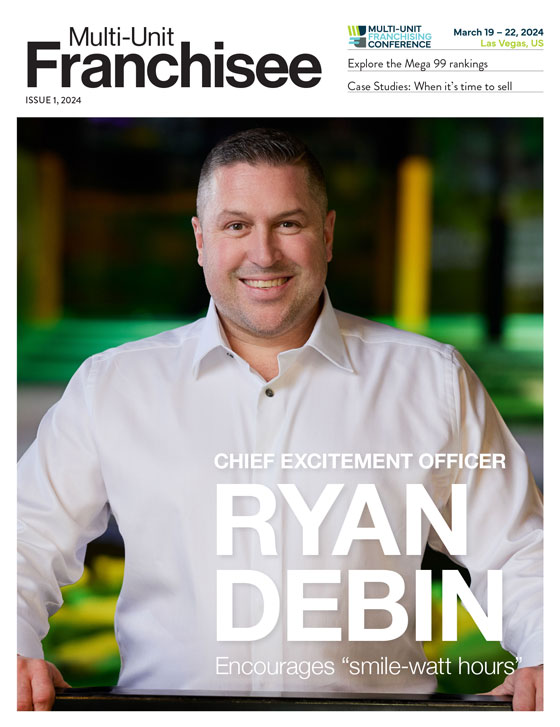Keep the End in Mind: Start asking 3 big questions now

“In this world nothing can be said to be certain, except death and taxes.” — Benjamin Franklin
For business owners, there is a lurking certainty. Eventually, they will exit the business. Will it be a thoughtfully planned event or a disaster? The impact of a disaster reaches far beyond the owner and family. Without a thoughtful plan, employees, customers, and vendors also suffer.
When thinking about transitioning the business, every owner must answer three questions:
- When would I like to get out? This establishes your timeline for accomplishing your “Why.” Don't know your “Why?” Investigate the question. Clarity keeps you focused on what matters most.
- What is my number? How much money do you need to move on? If you plan to retire, what is required to provide the lifestyle you seek?
- Who should take over? Is it a franchisee seeking to expand, a multi-brand investor, or someone yet to come along? If it is a family member or employee, be sure to tell them. It takes time to prepare your designated successor with the skills, judgment, and financial stability to ensure success.
The planning pyramid
Many start their planning by calling a lawyer. Sound legal advice is important, but it is not the starting point. Start with the foundation and move up the tiers of the pyramid.
Your business is a means of achieving your personal goals. Be clear about those goals—your “Why”—and how to move toward them. With your personal goals in mind, consider what values are most important to you and your family during the transition process.
What are your priorities? Do you want to maintain family harmony, provide stability for employees, and contribute to the community? Perhaps you want to take the business to the next level, or you might want to maintain the company culture. Are you driven by creating wealth to pass on to your heirs and enabling the next generation to become owners? On the practical side, you might want to minimize taxes. How do you feel about building a personal legacy or benefiting a charity? Maybe, you want to maintain or improve your lifestyle or prioritize health issues, work-life balance, and quality of life. You also might have your own questions to consider.
As you dive into the issues, involve your inner circle—at least your spouse and any working family members. The conversation forms the foundation for your plan. Because things change, revisit the conversation each year.
Investment value
The business can represent an entrepreneur's biggest investment. And your number may far exceed what you could sell for today. You might need to grow sales and profits to close the gap. Determine the sales and profits that would yield your number, and then set annual sales targets to close the gap. Use your cost structure (variable cost percentage and annual fixed costs) adjusted for major expansions, inflation, and other business changes to fill in the expenses by year. Don't forget P&L projections, cash flow forecasts, and borrowing plans. Even after your business is running, you need a business plan.
Financial impacts
Your buyer's bank considers the business value in their lending decision. They can kill the deal if they don't see the value even if you and the buyer agree. Profits and cash flow must be adequate for the new owner to make the payments.
How you transfer ownership has tax implications. Use tax professionals to avoid missteps before considering specific deals. What tax obligations would arise should you suddenly die? Are your cash reserves sufficient to pay the taxes? If not, your business may not survive the transition.
Having a business complicates estate planning so get something in place. Use an attorney experienced with estate planning for business owners.
You'll need a business coach to keep you on track with your goals, an accountant for sound financial forecasting, attorneys for wills and buy-sell agreements, a tax advisor, a personal financial planner, and an insurance professional. Build your team and meet yearly.
When to begin?
The best time to consider your exit strategy is before you get into business. Too late? Then the time is now. Start by setting personal and business goals, assemble your team, and start climbing.
What happens if you don't plan? Higher costs, less value, and more drama for everyone involved. Don't put it off another day.
Barbara Nuss is the president and founder of Profit Soup, a financial training firm specializing in providing developing skills for franchisors and franchisees that enable them to trust their numbers, focus on priorities, make better decisions, and earn more profit. Visit www.profitsoup.com.
| Long-Term Value Worksheet | ||
|---|---|---|
| 1 | How many years until the transition takes place? | ___ years |
| 2 | What’s “Your Number?” (What you want the business to be worth then.) | $ _____________ |
| 3 | What EBITDA multiplier is realistic for your industry? | ______ times |
| 4 | EBITDA Target for your investment (line 2 divided by line 3) | $_____________ |
| 5 | What EBITDA% is realistic? | ______% |
| 6 | Sales required (line 4 divided by line 5) | $______________ |
| 7 | What average sales per unit is reasonable? | $______________ |
| 8 | How many franchise units will you need? (line 6 divided by line 7, rounded up) |
___ units |
Share this Feature
Recommended Reading:
FRANCHISE TOPICS
- Multi-Unit Franchising
- Get Started in Franchising
- Franchise Growth
- Franchise Operations
- Open New Units
- Franchise Leadership
- Franchise Marketing
- Technology
- Franchise Law
- Franchise Awards
- Franchise Rankings
- Franchise Trends
- Franchise Development
- Featured Franchise Stories
FEATURED IN

Multi-Unit Franchisee Magazine: Issue 1, 2024

$150,000
$225,000





 The multi-unit franchise opportunities listed above are not related to or endorsed by Multi-Unit Franchisee or Franchise Update Media Group. We are not engaged in, supporting, or endorsing any specific franchise, business opportunity, company or individual. No statement in this site is to be construed as a recommendation. We encourage prospective franchise buyers to perform extensive due diligence when considering a franchise opportunity.
The multi-unit franchise opportunities listed above are not related to or endorsed by Multi-Unit Franchisee or Franchise Update Media Group. We are not engaged in, supporting, or endorsing any specific franchise, business opportunity, company or individual. No statement in this site is to be construed as a recommendation. We encourage prospective franchise buyers to perform extensive due diligence when considering a franchise opportunity.